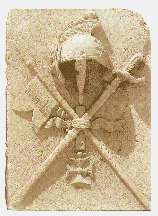

Founded by the Romans, Valencia has been the home of many cultures over its history: Romans, Visigoths, Moors and the Aragonese all made the city an important cultural and financial centre.
In the year 1094, Rodrigo Díaz de Vivar, called El Cid Campeador,
conquered Valencia on behalf of the Christians, but the city later fell to
the Almoravids in 1102. Following the Moorish domination, it was in 1238 that
James I of Aragon (  9Kb )
finally reconquered the city, and founded the Kingdom of
Valencia, with its characteristic legislative privileges (Furs).
9Kb )
finally reconquered the city, and founded the Kingdom of
Valencia, with its characteristic legislative privileges (Furs).
During the 15th and 16th centuries, Valencia became one of the major economic powers on the Mediterranean seaboard. It was the time of the Valencian siglo de oro (Golden Age), which was characterized by splendour in the arts at the hands of Joanot Martorell (author of Tirant lo Blanc, the first modern European novel), Ausias March, Roig de Corella, Isabel de Villena, Jordi de Sant Jordi and Jaume Roig, among others.
During the War of Spanish Succession, Valencia sided with archduke Charles of Austria, and after the victory of the Bourbons at the Battle of Almansa (April 1707), Phillip V abolished the local privileges, or fueros. In 1874, Alfonso XII was proclaimed constitutional king at Sagunto, north of Valencia.
When democracy was restored, the Land of Valencia was given its present Autonomous Statutes in 1982. The history of the city, now the capital of the Land of Valencia, is both rich and varied, providing a patrimony that has converted it into one of the major cities in Spain on both cultural and economic levels.